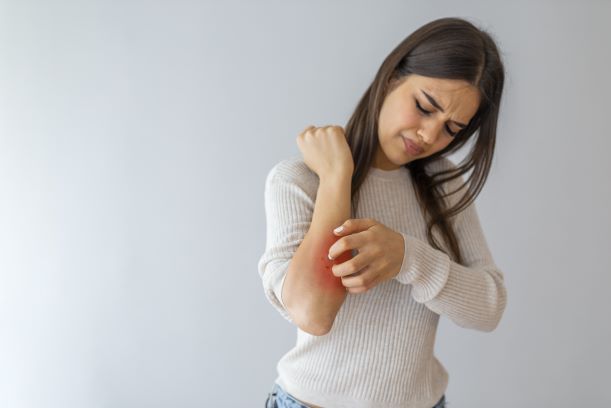As April showers begin to bring May flowers – and weeds and pollen and mold – it’s no surprise that people are experiencing a higher incidence of allergies, and that includes skin allergies. According to Dr. Gregory Walker of U.S. Dermatology Partners in Waco, Texas, “During the fall and winter months, people experience red itchy skin due to dryness or flareups in chronic skin conditions like eczema. In the spring and summer, skin irritation is more likely to be caused by reactions to allergens and pollens in the environment.” In this blog, you can learn more about common skin allergies, the causes, and how you can prevent and treat skin allergies.
Common Skin Allergies
Allergic skin reactions, like other types of allergies, are your body’s response to external or internal allergens and irritants. When the skin is exposed to these allergens or irritants, it causes itching, inflammation, and rashes. Here are five common types of skin conditions related to allergies:
- Atopic dermatitis (eczema) – A common skin condition that causes itching, irritation, and a rash. This condition is more likely to flare up in the dry winter months, but people with eczema may also be sensitive to spring and summertime allergens and irritants.
- Contact dermatitis – A skin reaction that develops after exposure to an allergen or irritant on the skin. The body overreacts to the exposure, leading to an itching, burning rash, and, in more severe cases, blisters or infection. For some people, sun exposure can worsen or trigger a contact dermatitis flareup. This is more likely for reactions to shaving creams, perfumes, or sunscreens.
- Urticaria (hives) – Red, very itchy welps on the body. Hives almost always develop after exposure to an allergen or irritant, but may also be caused by infections. There is also a form of chronic urticaria that is unlikely to be related to allergies and lingers for an extended amount of time.
- Angioedema – This is inflammation in the deeper layers of skin that may occur in conjunction with urticaria (hives). It is most common around the eyes, mouth, and genitals. There are hereditary and recurrent forms of angioedema that don’t typically have links to allergens. Allergic angioedema usually only lasts for a few hours before clearing up, and it is typically the result of consuming specific medications and foods. This can be an emergency if the swelling affects your ability to breathe.
- Other rashes – Irritating, itchy, and inflamed rashes can have other causes. In most cases, allergic rashes are localized in one area, but they can spread to cover larger parts of the body. Allergens and pollens can create general skin sensitivity that results in rashes that may not have a specific cause. In addition to an allergic response, rashes may appear due to infections and taking certain medications, so you should always have rashes examined by a medical professional.
Skin Allergy Causes
There are many causes of skin allergies, including:
- Environmental allergens – Plants like poison oak, ivy, and sumac, and bug bites, pet dander, or other allergens found in the environment can lead to skin allergies.
- Chemical allergens – Latex, rubber, cleaning products, cosmetics, sunscreens, bug sprays, perfumes, and other items you come into contact with every day contain chemicals that can cause allergic responses on the skin. Always pay attention when using new products and discontinue if you notice signs of allergic response.
- Metal – Nickel and other plated metals can cause skin discoloration as well as an allergic response like swelling and itching. Pay attention when wearing new jewelry, using metal hand tools, or otherwise working with metal as this can cause an allergic response.
- Sun exposure – Known as photosensitivity, some people may experience an allergic response to too much exposure to UVA/B rays. Most people would just tan or burn if they were in the sun for too long, but for those who have photosensitivity, the allergic response may cause blisters, rashes, or hives even when the person is only outside for a short time.
- Medications – Some medicines, especially topical medications, can lead to an allergic skin response. In fact, some people have allergies to hydrocortisone and other anti-itch remedies that are meant to soothe skin allergies. Any time you’re taking new medicines or applying topical ointments, pay attention to any signs of increased irritation and discontinue use.
- Foods – Consuming certain foods can lead to skin allergies just as these foods could cause other allergy symptoms like throat irritation, inflammation, and other concerns. Everyone responds to food allergies differently, so pay attention to what you’ve eaten if you notice signs of skin allergy.
Skin Allergy Symptoms
According to Dr. Walker, “After the first exposure to an allergen, people may not have a response for several days or even weeks. This can make it difficult to pinpoint the specific items you’re allergic to. After the allergy develops, responses to future exposure typically occur after a day or two, so it becomes easier to find the source of your allergy. If the allergic response is severe, your doctor may recommend diagnostic tests to determine the source of your allergic response rather than risking re-exposure.” Some of the main symptoms of skin allergies you should be aware of include:
- Itching or burning skin
- Skin irritation or pain
- Inflammation or swelling
- Redness or discoloration
- Oozing or weeping skin sores
- Cracked or dry skin
- Itchy bumps
- Hives (reddish-colored very itchy areas on the skin that may get paler when you put pressure on them)
- Itchy rash (clusters of red bumps with persistent itch)
- Scaling (thickened) or flaky skin
Skin Allergy Treatments
Dr. Walker says, “There are some skin allergic responses that require treatment by a dermatologist, but the majority of skin allergy responses are mild and can be treated at home.” There are three basic options to treat skin allergies: prevention, at-home care, and professional care.
Prevention
To prevent skin allergies, patients should take the following basic steps:
- Find the source of your allergy – In some cases, you may be able to determine the cause of your allergy without a professional diagnosis, but if you’re having frequent or prolonged skin allergies, a dermatologist can help you diagnose the underlying cause of skin allergies.
- Avoid skin allergens – Once you know the sources of your allergic response, do your utmost to avoid these allergens.
- Change your clothes and shower – After being exposed to allergens, you should change your clothes and shower right away. Many allergens can cling to clothing or skin and continue to cause irritation and make the allergic response more severe.
- Keep skin moisturized – After showering or bathing and as frequently as is necessary, you should apply moisturizer to keep skin healthy and reduce the risk for irritation and inflammation.
At-Home Care
If you’re experiencing an allergic skin response, take the following steps at home:
- Don’t scratch! This can cause additional irritation and increases your risk for skin infection.
- Try to determine the cause of the allergy to avoid further exposure.
- Take soothing colloidal oatmeal baths in lukewarm water.
- Apply moisturizer immediately following baths or showers and as often as necessary to keep skin moisturized and soothe irritation.
- Take over-the-counter allergy medicine (antihistamines) to help alleviate the symptoms of skin allergies. Be aware some antihistamines will make you sleepy!
- Use sunscreen and minimize sun exposure during an allergy flare-up. If you have photosensitivity, you should protect your skin anytime you are exposed to the sun’s rays. If you have an allergy to sunscreen or sunblock ingredients, discuss appropriate sun protection products with your dermatologist.
- Apply cold compresses to the area, especially if you have a painful, burning, or inflamed skin rash. Cold can also help to soothe the itch and minimize the urge to scratch.
- Wear loose-fitting clothing made from light, breathable materials to avoid further irritating the skin.
Professional Care
If your allergic skin response is severe or you notice signs of systemic allergy response like itching in the nose and throat or watering eyes, you should contact your dermatologist to receive more advanced treatment, including:
- Use of prescription creams or oral medications for allergies, including stronger or longer-lasting antihistamines, as directed by your dermatologist.
- Take prescription biologics to help control flareups caused by immune system responses in allergic skin conditions like atopic dermatitis.
- Take corticosteroids to address skin allergy responses to poison ivy, oak, and sumac.
While most skin allergies are mild and symptoms easily treated, there are rare cases where they can be serious or life-threatening. If you have any signs of anaphylaxis (closing of the throat and difficulty breathing or swallowing), you should seek emergency medical intervention immediately.
Visit U.S. Dermatology Partners
If you need help preventing or treating skin allergies or any other skin care needs, contact the U.S. Dermatology Partners location nearest you to schedule a consultation. Our board-certified dermatologists are committed to offering a range of exceptional dermatology services to help our patients look and feel their best.
Find a location near me
or


